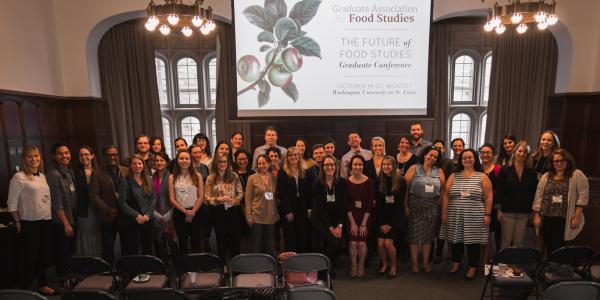On October 19-21, Washington University hosted the Future of Food Studies Graduate Conference, which brought together more than 50 graduate scholars from 17 disciplines, representing 31 different universities and 9 countries, for 2 days of intense dialogue and discussion. Participants came from as far away as Germany and India and from many universities including Brown, Berkeley, and Harvard. Overall, the conference offered novel theories and methodologies for the study of food and planted the seeds of new subjects of inquiry.
Jacob Eaton, a doctoral student in the Brown School of Social Work and one of the organizers of the event, says that he would describe food studies as “a burgeoning field that attracts a range of disciplines to answer broad questions about how food impacts our social fabric—everything from identity to the environment.”
“This conference, for instance, attracted graduate students from fields ranging from anthropology and sociology, to history and American studies, to geography and environmental studies - with a smattering of representation from public health, communication and media studies, and even library science. Central to everyone’s research are understandings of food that go beyond superficial analyses,” he explains.

Bradley Jones, a doctoral student in cultural anthropology and the head organizer of the event, says that, though food saturates the human experience, it’s still a relatively new area of study. “For years, the study of food occupied only the margins of academia, always on the table but rarely the main course. In the past two decades, however, food studies has leaped into the mainstream,” he says. “The field now boasts its own journals, professional associations, and undergraduate and graduate programs at institutions around the world. Scholars are problematizing local and global food systems, exploring the embodied experience of cooking and consuming food, and analyzing the ways that food produces and reproduces identity, to just scratch the surface.”
Jones credits the conference’s success with early planning, an organized team, and regular meetings on Skype. He says, “I can’t thank the planning committee enough and the support from so many departments across WashU. Building on the success of the inaugural Future of the Food Studies conference at Harvard University in the fall of 2015, we had a lot of the systems in place to streamline a successful event, but organizing a conference is a heck of a lot of work, especially one bringing in so many people from throughout the country and internationally. However, the rewards are legion.”
“The payoff of most academic labor is diffuse and delayed, but here it was extremely tangible: the new friendships, the chance to hear cutting edge scholarship, the exceptional conversations, the diverse fieldtrips, and the tremendous keynote lectures,” he says. “It was also a great opportunity to highlight the exceptional work of students and faculty across WashU, and further solidify our reputation as a national leader in the study of food and agriculture.”
Glenn Stone, a professor of anthropology and environmental studies as well as the faculty advisor to the conference, adds, “For me it was a thrill to address a large roomful of young scholars who represent the future of food studies. The conference was a bonanza of fresh research by a remarkable collection of graduate students from diverse fields. Food Studies is one of the most exciting synthetic fields to emerge in the academy, and this gathering made it clear that the field has enormous momentum.”
For Jones, getting to bring prominent scholars Krishnendu Ray and Alison Hope Alkon to campus was a treat, but he was most invigorated by the dialogue between attendees. “Conversation amongst peers from interdisciplinary backgrounds engendered an affability to ask questions freely while also encouraging critique of ‘common sense’ that might otherwise be taken for granted within the confines of home disciplines,” he says. “Nutritionists dialoguing with science and technology studies scholars, historians engaging with anthropologists, practitioners debating with theorists, this is where the important and intellectually-stimulating work happens.”
Eaton also found the time spent with his wider community of peers incredibly gratifying. “Far and away the highlight was the opportunity to discuss so many aspects of food with individuals in similar career positions as myself,” he says. “Conferences can be nerve-wracking as a graduate student: your research may be new, you’re presenting in front of very large crowds, and there is always an underlying pressure to impress those who may be reading your job application in a few years’ time. Even networking and social aspects of larger conferences carry this same tension. At this conference, however, it felt like everyone was getting to know each other simply out of shared passions and interests. It felt like being surrounded with people who I’d worked with for years.”
Jones, Eaton, and Stone note that the conference would not have been possible without support from various departments, programs, and schools across WashU, including Anthropology, English, History, American Culture Studies, Environmental Studies, the Center for the Humanities, and Brown School of Social Work. Additional support came from the American Studies program at Harvard and the Umbra Institute, a study abroad program in Italy with a strong emphasis on food studies. Jones says, “The biggest thank you, though, is owed to Association for the Study of Food and Society, the premier scholarly society for food studies. Their seed grant has made this conference possible, as well as iterations of it in the future. No other organization is more committed to seeing food studies flourish.”
Though the conference has now passed, Stone notes that an Agri-Food Group is being formed on the Danforth Campus for graduate students and faculty who are interested in these topics. It is being organized through the anthropology department, with Stone at its head, but is very interdisciplinary. The first meeting with be held Nov. 13 from 3-4pm. Stone says to contact him if interested for more details.





